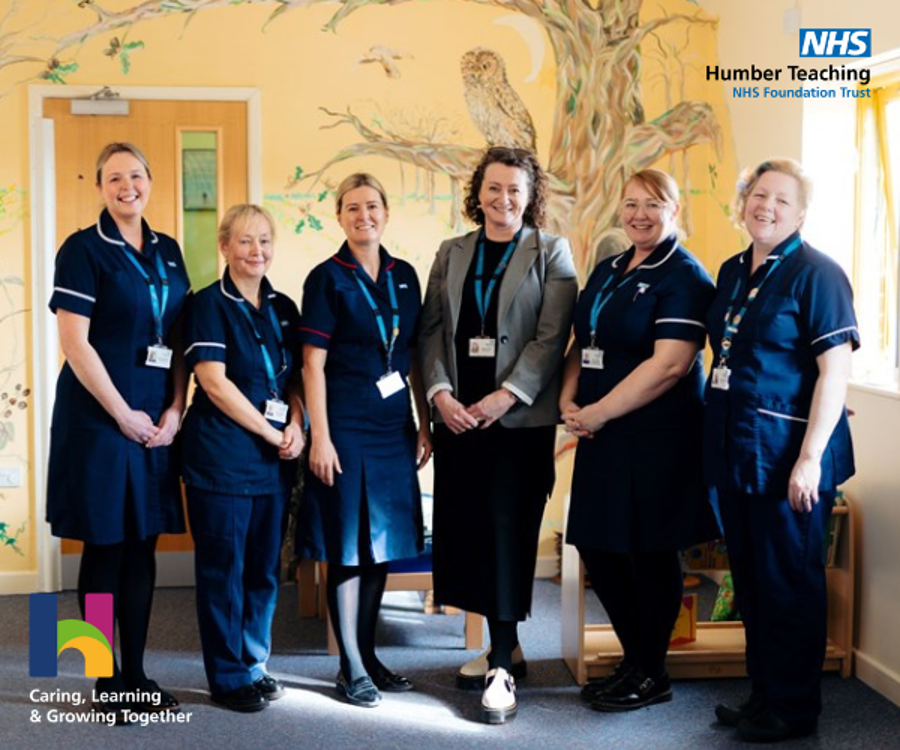The Royal Foundation Launches Next Stage of Infant Wellbeing Study
Published: 27 January 2025

Humber Teaching NHS Foundation Trust is delighted to share we are one of only eight NHS Trusts now getting ready for the second stage of a study in the Alarm Distress Baby Scale (ADBB), funded by The Royal Foundation. The study will run until March 2026.
Our involvement will help provide a huge boost for our local region’s Health Visitors and the families they care for.
In 2022, the Princess of Wales observed health visitors in Denmark using the tool on a visit she took. In 2023, The Royal Foundation Centre for Early Childhood funded the first phase of study to assess feasibility in the UK, with “overwhelmingly positive results”. Our Trust was one of the first to pilot the study.
Phase one explored the feasibility of implementing a modified version of the tool (m-ADBB) within health visitors’ routine 6-8-week checks with families and delivered incredibly positive results. Our Trust’s Health visitors reported that the new training and tool, which required minimal additional time and could be embedded into routine activities with families, enabled them:
- To have more meaningful conversations with parents and carers about the emotional wellbeing of their baby;
- To promote positive parent-infant interactions, attachment, and bonding;
- To identify those babies and families in need of greater support during this critical period of development.
The tool, known internationally as the Alarm Distress Baby Scale (ADBB), focuses on a baby’s social behaviours such as eye contact, facial expression, vocalisation, and activity levels to help practitioners and families better understand the ways babies express their feelings. Providing support at this critical time, when babies’ brains are developing faster than at any other time in their lives, can have a life-long impact.
Rebecca Price, Service Manager in Hull 0-19 Integrated Public Health Nursing Service at Humber Teaching NHS Foundation Trust said:
“Our teams experienced significant benefits from the initial stage of this pilot and are thrilled to progress to the second stage. The ADBB tool equips our health visitors with deeper insights into infant social behaviours, enabling them to identify key indicators for targeted support and effective intervention.”
Christian Guy, Executive Director of The Centre for Early Childhood, said:
“We know that warm, loving, responsive interactions with those closest to them during the earliest weeks and months of a baby’s life are crucial in promoting positive brain development. Health visitors do such a vital job in our communities. I am delighted that we are now able to give more teams across the UK the support they need to help thousands of families to better understand their babies and build nurturing relationships, laying the strongest possible foundations for all that is to come in the years that follow.”
Alison Morton, Chief Executive of the Institute of Health Visiting (iHV) said:
“We are delighted to have the continued support from the Royal Foundation Centre for Early Childhood to deliver the second phase of this exciting programme of work. As we know, babies can’t talk, but there is significant evidence that their early experiences influence their future outcomes. The expansion of the use of the modified ADBB tool in a wider range of health visiting services will allow us to consider its future implementation and sustainability, and ensure more families get the right support and babies can thrive.”
Our Trust will now be moving on to the second phase, funded by the Centre for Early Childhood, to build upon the initial findings and focus on the impact of the tool, and how it is experienced by parents. The evaluation will also look at whether more babies receive the additional support they need as a result of the tool helping health visitors to identify concerns as early as possible.









